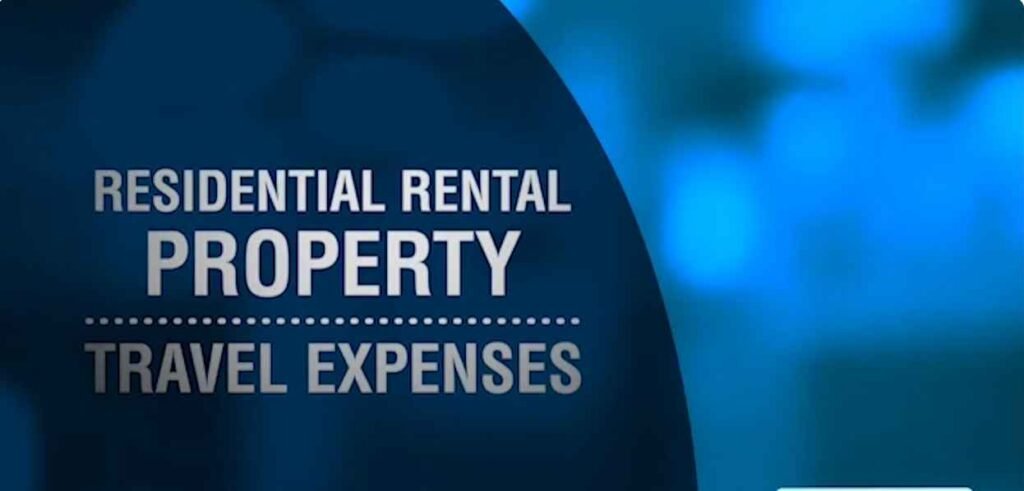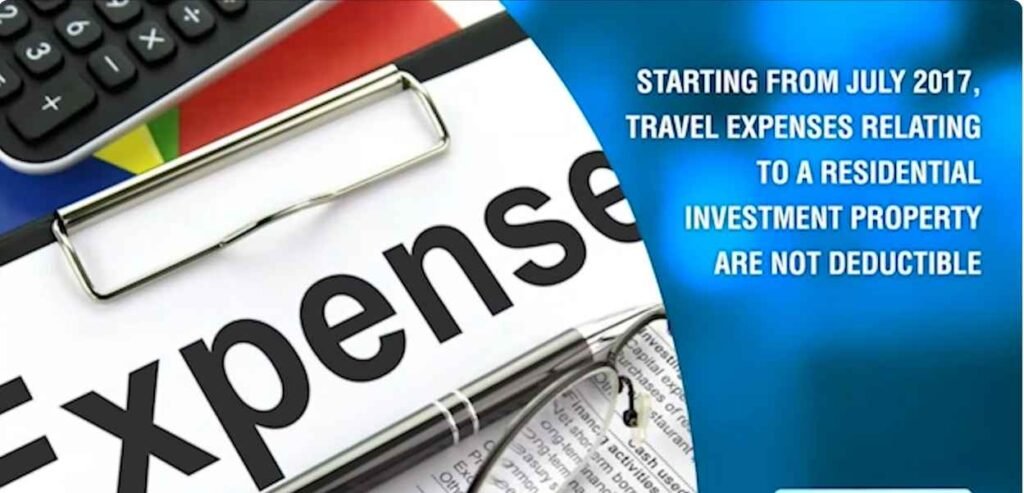Yes, you can claim travel expenses for rental property for maintenance or rent collection. These costs can be deducted from your rental income, reducing your overall tax liability.
Travel expenses related to a rental property are often overlooked by property owners.
It’s a crucial aspect to consider for both long-term financial planning and immediate tax implications.
Wandering the specifics of what makes these travel costs deductible requires understanding the tax code and IRS guidelines.
Landlords must ensure the trips are solely for rental business activities to legitimately claim them.
Clear records, like mileage logs and receipts, are crucial to support deductions and withstand tax scrutiny.
Proactive planning and organized expense tracking optimize rental property’s finances and reduce tax burdens.
Table of Contents
Toggle- Eligibility For Claiming Travel Expenses
- Types Of Deductible Travel Expenses
- Impact Of Tax Reform On Travel Deductions
- Documenting Your Expenses
- Reasonable And Necessary Expenditures
- Specific Situations And Their Deductions
- Joint Ownership Travel Expense Claims
- The Role Of Professional Advisors
- Case Studies: Successful Travel Expense Claims
- Preparing For Audits And Reviews
- Frequently Asked Questions On Can You Claim Travel Expenses For Rental Property
- Conclusion
Eligibility For Claiming Travel Expenses

Mastering the rules for tax deductions on travel expenses for rental properties is vital for landlords. Not all travel costs can be claimed.
Knowing eligibility criteria ensures valid claims and avoids trouble with tax authorities. Let’s explore what qualifies for claiming these expenses.
Qualifying Criteria
Travel expenses for rental property owners must meet specific conditions. All the trips must relate directly to the rental activity to be claimable. These conditions are:
- Owning a rental property: The trip must concern a property you own and rent out.
- Income-producing property: The property must generate rental income.
- Legitimate reasons: The travel serves a purpose such as repairs or tenant meetings.
- Documentation: You need records such as receipts and mileage logs.
Purpose Of Travel
The reason for your trip is key for expense claims. Only travels with a clear business purpose for your rental qualify. These are:
- Inspecting the property condition.
- Meeting with tenants for leasing agreements.
- Maintenance or repair-related work.
Personal detours on trips make expenses partly non-claimable. Keep business and leisure separate for clear claims.
Types Of Deductible Travel Expenses
When you own rental property, understanding which travel expenses you can deduct is crucial. It can trim your tax bill.
Let’s dig into the different types of deductible travel costs that can benefit rental property owners. Always consult your tax professional to apply these to your situation.
Transportation Costs
Moving from one location to another? Transportation costs can be deducted. This includes a variety of travel methods.
- Airfare: Flights to manage or inspect your property.
- Car expenses: Gas, upkeep, and rentals when traveling locally or long-distance.
- Other travel: Trains, buses, and even taxis.
Keep your receipts! They are your proof for the IRS. You can also use standard mileage rates. For 2023, it’s 58.5 cents per mile.
Accommodation And Meals
Staying overnight? You can deduct accommodation. Always stay within IRS guidelines for “ordinary and necessary” costs.
Eating while working on your property? Meal deductions are allowed. Yet, only 50% of the meal costs are deductible.
| Expense Type | Is It Deductible? |
|---|---|
| Hotel Stay | Yes |
| Restaurant Meals | 50% |
Remember, personal expenses during a trip aren’t deductible. Keep a clear record separating business from pleasure.

Impact Of Tax Reform On Travel Deductions
The Impact of Tax Reform on Travel Deductions has been substantial for property owners looking to claim their travel expenses.
Navigating the recent adjustments requires understanding the specifics of what changed and how it affects your rental property tax planning.
Recent Changes To Tax Laws
The Tax Cuts and Jobs Act (TCJA) of 2017 initiated several major shifts in tax legislation, impacting landlords. Under this new law, many deductions previously available were either reduced or eliminated, directly affecting the profitability and expense management of rental properties.
- Evaluation of personal vs. rental expenses became stricter
- Itemized deductions faced new limitations
- Miscellaneous itemized deductions were largely phased out
What’s Not Covered Anymore
With the implementation of the TCJA, landlords can no longer deduct the cost of travel to their rental property if it’s deemed personal. This can include:
| Type of Expense | Covered (Y/N) |
|---|---|
| Commuting to the rental site | No |
| Property Inspection Trips | Depends (purpose) |
| Travel for Repairs | Yes (case-by-case) |
| Attending Real Estate Seminars | No |
Strict documentation is key. Taxpayers must prove the expense was exclusively for rental property activity to claim it as a deduction.
Documenting Your Expenses
As a savvy rental property owner, knowing which expenses to claim can save you money. Yet, the key to unlocking these tax deductions lies in documenting your expenses thoroughly. Keeping track of travel expenses is critical to proving they’re related to your property management tasks.
Record Keeping Best Practices
To ensure the IRS recognizes your travel expenses, adopt a meticulous approach to documentation. Here’s how to keep your records in top shape:
- Keep a logbook: Record dates, destinations, and purposes for all trips.
- Use digital tools: Apps can track mileage and expenses in real time.
- Store receipts: Save all travel-related expenditure proofs.
- Clarify expense reasons: Note why each expenditure is property-related.
Proof Of Property Management Activities
IRS needs evidence that the travel was for property management. Ensure your proof aligns with these activities:
- Repairs and maintenance: Log work done on your property.
- Tenant relations: Keep correspondence and meeting notes.
- Property inspections: Have dated inspection reports.
- Rental property advertising: Document marketing efforts.
Reasonable And Necessary Expenditures
When you own a rental property, it’s key to understand ‘Reasonable and Necessary Expenditures’. These costs relate to travel for the maintenance, management, and conservation of your property. The IRS permits deductions on such expenses. Yet, they must align with strict criteria. They cannot be lavish.
Understanding Reasonableness
Understanding reasonableness is crucial. It means spending what’s typical for the service you need. Also, the cost should be in line with what an average person would consider acceptable.
- Mileage to the property aligns with IRS rates.
- Airfare for trips solely for rental activities.
- Reasonable hotel charges if overnight stays are necessary.
Limitations On Luxury Expenses
The rule against luxury expenses serves as a limitation. For tax purposes, these do not count as reasonable. Here are examples of limitations:
| Type of Expense | Luxury (Not Deductible) | Reasonable (Deductible) |
|---|---|---|
| Accommodation | Five-star hotel | Mid-range hotel |
| Transport | First-class flight | Economy-class flight |
| Dining | Gourmet restaurants | Standard meals |
Document each expense. Always keep receipts and logs. This ensures that every claim falls squarely within IRS guidelines.
Specific Situations And Their Deductions

Investors often wonder about tax deductions on travel for rental property management. Different travel scenarios can yield various deductions. It’s crucial to identify which expenses you can legally claim. Let’s explore specific situations and their corresponding deductions in detail.
Long-distance Travel
Landlords traveling far to manage rental properties may deduct several expenses:
- Airfare: Cost for flights to and from the property location.
- Lodging: Hotel stays during property-related visits.
- Car Rentals and Mileage: Including gas, if driving your vehicle.
- Meals: A percentage of meal expenses might be deductible.
Compile all receipts and log details for each trip. Only claim trips focusing on rental activity. Trips that mix business with pleasure require careful deduction allocation.
Local Trips
Short trips related to property management also offer deductions:
- Mileage: Claim the standard rate per mile when driving to the rental.
- Parking Fees and Tolls: These add up, so keep track.
- Public Transport: Expenses for buses, subways, and trains taken for rental tasks.
Note the purpose of each local trip. Deduct only those for rental operations. Maintenance, tenant meetings, and supplies pick-up are examples of valid deductions.
Joint Ownership Travel Expense Claims
When co-owning rental property, managing travel expenses can be tricky. Various rules apply depending on the ownership structure. Properly claiming these expenses on tax returns is crucial for joint owners. Let’s dive into the specifics of how to handle travel expenses for rental property when more than one person is involved.
Dividing Costs Among Owners
Splitting travel costs is not a one-size-fits-all process. Each owner’s share is typically proportional to their ownership percentage. Here’s a simple way to understand how to divide the expenses:
| Owner | Ownership Percentage | Travel Expense Share |
|---|---|---|
| Owner A | 50% | 50% of Costs |
| Owner B | 30% | 30% of Costs |
| Owner C | 20% | 20% of Costs |
Each owner should keep detailed records of their travel expenses. It ensures fairness in expense claims come tax time.
Partnership Agreements And Tax Implications
Travel expenses for rental properties in a partnership set up impact tax filings. A clear agreement outlines how partners handle these costs. This agreement should address travel expense deduction methods and reporting practices.
- Partners must agree on the allocation of travel costs.
- The partnership agreement dictates the reimbursement process.
- Tax implications include the potential for deductions on individual tax returns.
Deductibility of travel expenses hinges on their qualification as necessary and ordinary. Partners should consult with a tax professional for personalized advice.
The Role Of Professional Advisors
Managing rental property finances can be complex. It’s crucial to understand the role professional advisors play. These experts ensure property owners make informed decisions regarding their travel expenses and deductions.
When To Consult A Tax Professional
Owning rental property often means dealing with various tax implications. Property investors should consider professional advice for:
- Complex tax laws: Navigating these ensures correctness.
- Maximizing deductions: Experts identify all allowable claims.
- Keeping records: Advisors recommend efficient methods.
Seek an advisor before tax season or when purchase or sale decisions arise.
How Advisors Can Minimize Risks
Advisors provide clarity on what can be claimed and what’s non-deductible. They ensure owners:
- Avoid costly mistakes and penalties.
- Stay updated on tax law changes.
- Prepare for audits with accurate logs.
Proper guidance can lead to optimal financial outcomes and peace of mind.
Case Studies: Successful Travel Expense Claims
Investors often wonder if they can deduct travel expenses related to their rental property.
Real-life examples offer insight into what the IRS allows.
Examples Of Approved Deductions
Let’s dig into some cases where the IRS nodded in approval:
- Property Purchase: Jane traveled to inspect a potential investment. Her flight and hotel were deductible.
- Maintenance Trip: John drove 200 miles to oversee repairs. His mileage and meal costs were approved.
- Annual Check: Emily’s yearly property visit to perform various checks ensured her travel costs were covered.
Deductions depend on the property’s use and the purpose of the trip.
Analyzing Denied Claims
Not every claim passes the IRS muster. Here’s a brief look at what went wrong:
| Case | Reason for Denial |
|---|---|
| Mixed-Use Travel | Mark’s beachside getaway mixed business with pleasure. The non-business part wasn’t deductible. |
| Lack of Documentation | Linda lost her receipts. Without proof, her claims got disallowed. |
| Investigative Travel | Alex’s trip to a real estate seminar provided no direct link to his property, leading to non-deduction. |
Detailed records and a clear link between your travel and your rental business are crucial.
Preparing For Audits And Reviews
Investors in rental properties often face the prospect of tax audits. Understanding what can trigger a review and how to prepare is crucial. Especially when claiming travel expenses, attention to detail and proper documentation are key. This ensures that, if examined, all claims are substantiated, and the process is more likely to go smoothly.
Common Audit Triggers
Several factors can prompt the IRS or other tax authorities to take a closer look at your tax returns. Knowing these triggers can help you stay ahead:
- Excessive deductions compared to your income level
- High mileage claims without proper logs
- Costs that seem personal rather than business-related
- Large losses from rental activities were reported repeatedly
Tips For A Smooth Review Process
To alleviate potential audit headaches, implement these strategies:
- Keep detailed records of travel, including dates, purposes, and expenses
- Use a dedicated credit card for rental property expenses
- Hold onto receipts, logs, and reports for at least seven years
- Consult with a tax professional to ensure proper deduction practices
Employing these tips will not only prepare you for an audit but also provide you with peace of mind throughout the year.
Frequently Asked Questions On Can You Claim Travel Expenses For Rental Property
Can I Deduct Travel Expenses To A Rental Property?
Yes, you can deduct travel expenses from your rental property as long as they are ordinary, necessary, and directly related to the rental activity. This includes transportation, lodging, and meals if your trip is overnight.
Are There Limits To Rental Property Travel Deductions?
There are limits to travel deductions for rental property. The travel expenses must be primarily for rental activities, not personal. The IRS scrutinizes these deductions, so keeping detailed records and receipts is crucial for substantiation.
What Type Of Travel Expenses Qualify For Rental Property Deductions?
Qualifying travel expenses for rental property include airfare, car mileage, hotel costs, and meals during the travel period. These must be directly related to the management, conservation, or maintenance of the property.
How Do I Prove My Travel Was For Rental Property Management?
To prove travel was for rental property management, keep thorough records. This includes itineraries, invoices, receipts, and logs of business activities during the trip. Evidence of business communication, such as emails or calls, can also support your claim.
Conclusion
Understanding the intricacies of tax deductions is vital for rental property owners. Claiming travel expenses can lead to significant savings. Keep abreast of IRS guidelines to ensure compliance and maximize your deductions. Always consult with a tax professional for personalized advice.
Make informed decisions for your property investment journey.



